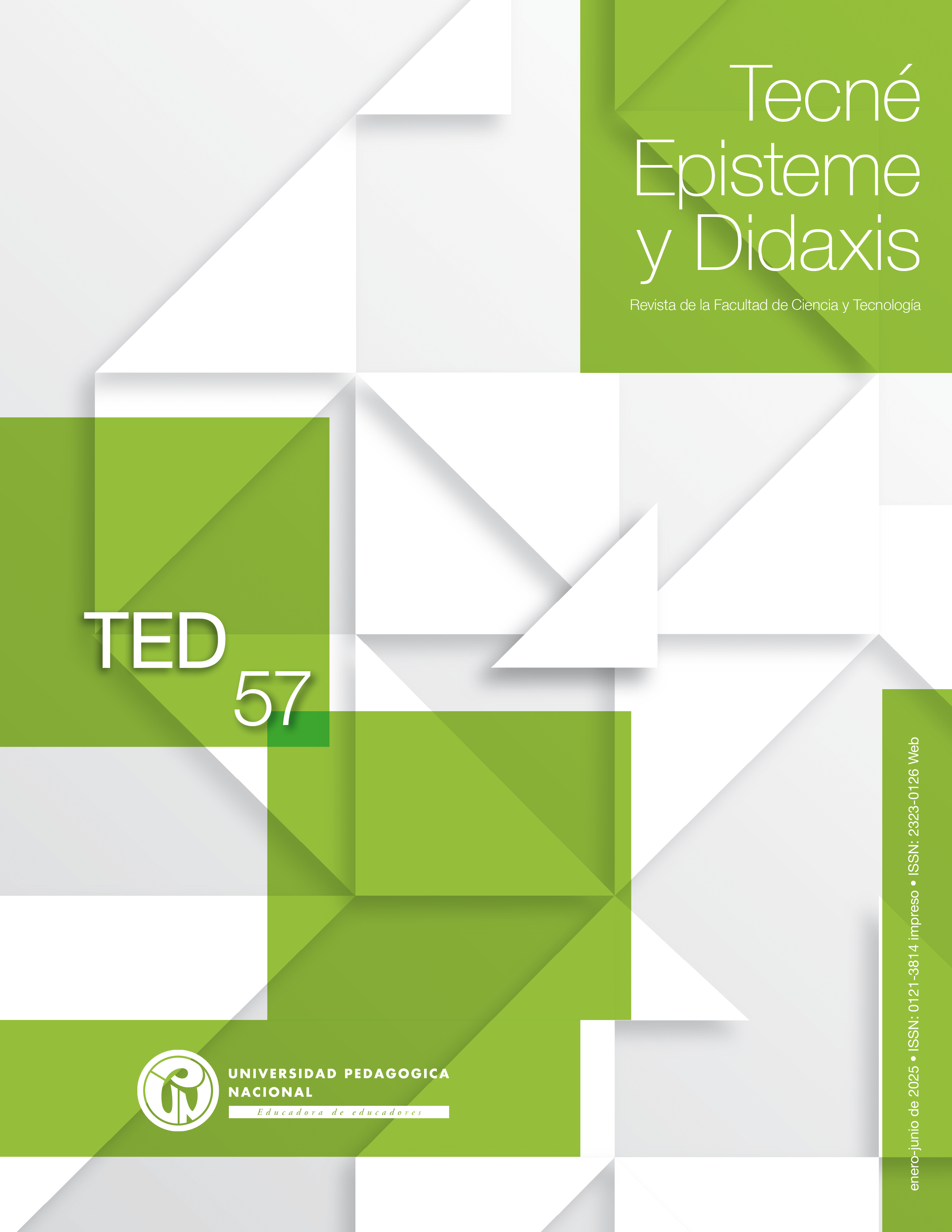Conocimiento didáctico del contenido, un constructo conceptual relevante en la enseñanza de las ciencias básicas
Resumen
En esta revisión, se describen las características que han posicionado al constructo conceptual denominado Conocimiento Didáctico del Contenido (CDC) como una poderosa herramienta teórico-metodológica que permite identificar la naturaleza de los conocimientos base para la enseñanza de las ciencias básicas. Se describen asimismo diferentes aproximaciones que fueron robusteciendo su definición conceptual, para dar paso posteriormente a su análisis y desglose en componentes o sub-dimensiones que permitieron desarrollar metodologías para su cuantificación como variable operativa, no sin advertir que su medición resulta un tanto compleja debido a la naturaleza misma del constructo. Ambas descripciones, como concepto y variable, han potenciado su relevancia como un constructo que puede incidir fuertemente en los conocimientos que un profesor de ciencias puede desarrollar para mejorar su enseñanza, además de proveerle de un marco teórico-metodológico para su actualización profesional y docente
Citas
Agüero-Servín, M., Martínez-Álvarez, S. I. y Mansilla, M. P. (2022). Formación y profesionalización docente en la educación media superior en México: revisión crítica y narrativa de la literatura científica. Revista Electrónica en Educación y Pedagogía, 6(10), 228-248. https://doi.org/10.15658/rev.electron.educ.pedagog22.04061015
Alfonso, M., López, M. M. y Mendoza, I. (2014). El docente y su rol en el proceso de superación profesional. Universidad y Sociedad, [seriada en línea], 6(1), 52-60. http://rus.ucf.edu.cu/index.php/rus
Alsina, A. y Delgado, R. (2021). Identificando los conocimientos para enseñar matemáticas en educación infantil, un primer paso para el desarrollo profesional. Revista Sergipana de Matemática e Educaçao Matematica, 2, 1-23. https://doi.org/10.34179/revisem.v6i2.16003
Aramburuzabala, P., Hernández, R. y Ángel, I. C. (2013). Modelos y Tendencias de la Formación Docente Universitaria. Revista Profesorado, 17(3), 345-357. https://revistaseug.ugr.es/index.php/profesorado/article/view/19703
Barrera, F. y Reyes, A. (2013). Elementos Didácticos y Resolución de Problemas: Formación Docente en Matemáticas. Universidad Autónoma del Estado de Hidalgo.
Ball, D. L, Thames, M.H. y Phelps, G. (2008). Content knowledge for teaching: What makes it special? Journal of Teacher Education, 59, 389-407.
Baumert, J., Kunter, M., Blum, W., Brunner, M., Voss, T., Jordan, A. y Klussman, U. (2010). Teachers’ mathematical knowledge, cognitive activation in the classroom, and student progress. American Educational Research Journal, 47(1), 133-180. http://dx.doi.org/10.3102/0002831209345157
Camejo, S. (2017). Schön, el profesional reflexivo, como piensan los profesionales cuando actúan. Educación en contexto, 2(5), 113-119.Campos-Nava, M. y Ramírez-Díaz, H. (2019). Diseño de un instrumento para caracterizar el Conocimiento Didáctico del Contenido en profesores de Física sobre un Tópico específico. Góndola, Enseñanza y Aprendizaje de las Ciencias, 14(2), 340-359. http://doi.org/10.14483/23464712.13900
Campos, M., Ramírez, H., Flores, E., Torres, A. y Morales, L. M. (2021). Mathematical Knowledge to Teach Physics and Teacher Training: the case of kinematics graphs. Turkish Journal of Computer and Mathematics Education, 12(14), 5925-5939. https://doi.org/10.17762/turcomat.v12i14.11913
Carlson, J., Daehler, K. R., Alonzo, A. C., Barendsen, E., Berry, A., Borowski, A., Carpendale, J., Chan, K. K. H., Cooper, R., Friedrichsen, P., Gess-Newsome, J., Henze-Rietveld, I., Hume, A., Kirschner, S., Liepertz, S., Loughran, J., Mavhunga, E., Neumann, K., Nilsson, P., Park, S., Rollnick, M., … y Wilson, C. D. (2019). The Refined Consensus Model of Pedagogical Content knowledge in Science Education. En A. Hume, R. Cooper y A. Borowski (Eds.), Repositioning Pedagogical Content Knowledge in Teacher’s Knowledge for Teaching Science (pp. 77-92). Springer. https://doi.org/10.1007/978-981-13-5898-2.2
Carpenter, T. P., Fennema, E., Peterson, P. L. y Carey, D. A. (1988). Teacher’s Pedagogical Content Knowledge of Students Problem Solving in Elementary Arithmetic. Journal of Research in Mathematics Education, 19(5), 385-401.
Conesa, P. y Egea, P. (2000). Operativización de variables en la investigación psicológica. Revista Psicothema, 12(2), 157-162.
Díaz-Barriga, F. (2014). Formación docente y Educación basada en Competencias. En Á. Valles Flores (Coord.), Formación en Competencias y Certificación Profesional (pp. 76-104). unam iisue.
Escudero, T. (2003). La Formación Pedagógica del Profesorado Universitario vista desde la Enseñanza Disciplinar. Revista de Educación, 331, 101-121.
Etkina, E. (2010). Pedagogical content knowledge and preparation of high school physics teachers. Physic Education Research, 6, 1-26. http://dx.doi.org/10.1103/PhysRevSTPER.6.020110
Evens, M., Elen, J. y Depaepe, F. (2016). Pedagogical Content Knowledge in the context of foreign and second language teaching: a review of research literature. Porta linguarum, 26, 187-200.
Finson, K., Pedersen, J. y Thomas, J. (2001). Comparing Science Teaching Style to Student’s Perception of Scientist. School Science and Mathematics, 106(1), 8-15.
Flores-Castro, E., Campos-Nava, M., Ramírez-Díaz, M. H. y Moreno-Ramos, J. (2024). The Construction of Knowledge for Teaching of Sciences: a Reflection Seem from the Pedagogical Content Knowledge. Kurdish Studies, 12(1), 3536-3555. https://doi.org/10.58262/ks.v12i1.251Garritz, A. (2014). Creencias de los Profesores, su importancia y cómo obtenerlas. Educación Química, 25(2), 88-92.
Gess-Newsome, J. (1999). Pedagogical Content Knowledge, an introduction and orientation. En J. Gess-Newsome y N. G. Lederman (Eds.), pck and Science Education (pp. 3-17). Kluwer Academic Press.
Grossman, P. L. (1990). The making of a teacher: teacher knowledge and teacher education. Teachers College Press.
Haidar, A. y Teti, C. (2015). Una primera aproximación a la caracterización del conocimiento didáctico del contenido de docentes. En: IV Jornadas de Enseñanza e Investigación Educativa en el campo de las Ciencias Exactas y Naturales, 28, 29 y 30 de octubre, Ensenada, Argentina.
Hill, H. C., Schilling, S. y Ball, D. L. (2004). Developing Measures of Teacher’s Mathematics knowledge for Teaching. The Elementary School Journal, 105(1), 11-30. https://doi.org/10.1086/428763
Hume, A. C. y Berry, A. (2011). Constructing cores-a strategy for building pck in pre-service science teacher education. Research in Science Education, 41(3), 341-355. https://doi.org/10.1007/s11165-010-9168-3
Jüttner, M., y Neuhaus, B. J. (2013). Validation of a paper-and-pencil test instrument measuring biology teachers’ pedagogical content knowledge by using think-aloud interviews. Journal of Education and Training Studies, 1(2), 113-125. http://dx.doi.org/10.11114/jets.v1i2.126
Krauss, S., Brunner, M., Kunter, M., Baumer, J., Blum, W., Neubrand, M. y Jordan, A. (2008). Pedagogical Content Knowledge and Content Knowledge of Secondary Mathematics Teachers. Journal of Educational Psychology, 100(3), 716-725. https://doi.org/10.1037/0022-0663.100.3.716
Lange, K., Kleickmann, T. y Möller, K. (2012). Elementary Teacher’s Pedagogical Content Knowledge and Student Achievement in Science Education. En: C. Bruguiere, A. Tiberguien y P. Clément (Eds.), Science Learning and Citizenship. Proceedings of the Ninth ESERA-Conference 2011, Lyon.
Leal-Castro, A. (2014). El Conocimiento Didáctico del Contenido: una herramienta que contribuye en la configuración de la identidad profesional del Profesor. Revista Magistro, 8(15), 89-110.
Llinares, S. (2000). Intentando comprender la práctica del profesor de matemáticas. En: J. P. da Ponte y L. Serrazina (Coords.), Educaçao matemática em Portugal, Espanha e Italia (pp. 109-132). Secção de Educação Matemática da Sociedade Portuguesa de Ciências de Educação.
Lozano, A. (2016). La formación docente en la educación media superior en México, retos y posibilidades. XI Seminario Internacional de la Red Estrado, noviembre 16-18, Ciudad de México.
Luft, J. y Roehrig, G. (2007). Capturing Science Teacher’s Epistemological Beliefs: the development of the teachers beliefs interview. Electronic Journal of Science Education, 11(2), 38-53.
Magnusson, S., Krajcik, J. y Borko, H. (1999). Nature, source and development of pedagogical content knowledge for science teaching. En: J. Gess-Newsome y N. G. Lederman (Eds.), pck and Science Education (pp. 95-132). Kluwer Academic.
Mansour, N., Said, Z. y Abu-Tineh, A. (2024). Factors impacting science and mathematics teachers’ competencies and self-efficacy in tpack for pbl and stem. Eurasian Journal of Mathematics, Science and Technology Education, 20(5), em2442. https://doi.org/10.29333/ejmste/14467
Markic, S., Eilks, L. y Valanides, N. (2008). Developing a tool to evaluate differences in beliefs about science teaching and learning among freshman science students teachers from different science teaching domains: a case study. Eurasia Journal of Mathematics, Science and Technology Education, 4(2), 109-120. https://doi.org/10.12973/ejmste/75311
Mavhunga, E. y Rollnick, M. (2013). Improving pck in Chemical Equilibrium in Pre-Service Teachers. African Journal of Research in Mathematics, Science and Technology Education, 17(1-2), 113-125. https://doi.org/10.1080/10288457.2013.828406
Miller, D., Pinerua, I., Margolin, J. y Gerdeman, D. (2022). Teacher’s Pedagogical Content Knowledge in Mathematics and Science. A Cross-Disciplinary Synthesis of Recent DRK-12 Projects. American Institutes for Research. https://www.air.org/sites/default/files/2022-05/Teachers-Pedagogical-Content-Knowledge-in-Math-and-Science-April-2022.pdf
Mkhwanazi, S. (2013). Teacher Professional Learning: an Analysis of Teacher’s Views on their Professional Content Knowledge. Journal of Social Sciences, 37(2), 179-187. https://doi.org/10.31901/24566756.2013/37.02.09
Morrison, A. D. y Luttenegger, K. C. (2015). Measuring Pedagogical Content Knowledge using multiple point of data. The Qualitative Report, 20(6), 798-809. https://doi.org/10.46743/2160-3715/2015.2155
Padilla, K. y Garritz, A. (2014). Creencias Epistemológicas de dos profesores-investigadores de la Educación Superior. Educación Química, 25(3), 343-353.
Parga, D. L. y Mora, W. M. (2017). El CDC en química: una línea de investigación y de relaciones con la práctica docente. En X Congreso Internacional sobre Investigación en Didáctica de las Ciencias, Sevilla, 5-8 septiembre.
Park, S. y Oliver, J. S. (2008). Revisiting the conceptualization of pedagogical content knowledge (pck): pck as a conceptual tool to understand teachers as professionals. Research in Science Education, 38(3), 261-284. https://doi.org/10.1007/s11165-009-9163-8
Pinto, J. E. y González, M. T. (2008). El Conocimiento Didáctico del Contenido en el Profesor de Matemáticas ¿una cuestión ignorada? Educación Matemática, 20(3), 83-100.
Rico, L. y Sierra, M. (2000). Didáctica de la matemática e investigación. En J. Carrillo y L. C. Contreras (Eds.), Matemática española en los albores del siglo XXI (pp. 77-131). Hergué.
Roux, R. y Mendoza, J. (2014). El Concepto de Desarrollo Profesional Continuo. En R. Roux y J. Mendoza (Coords.), Desarrollo Profesional Continuo de los Docentes: Teoría, investigación y práctica. El Colegio de Tamaulipas.
Sakaria, D., Matt, S. M. y Matore, M. E. E. (2023). Factors influencing mathematics teacher’s pedagogical content knowledge (pck): A systematic review. Pegem Journal of Education and Instruction, 13(2), 1-14. https://doi.org/10.47750/pegegog.13.02.01
Schön, D. (1992). La formación de profesionales reflexivos, hacia un nuevo diseño en la enseñanza y aprendizaje en las profesiones. Paidós.
Shulman, L. S. (1986). Those who understand: knowledge growth in teaching. Educational Research, 15(2), 4-14.
Sosa, L. y Ribeiro, C. M. (2015). El conocimiento profesional como característica distintiva de profesionalización docente en formación de profesores. Revista Iberoamericana de Producción Académica y Gestión Educativa, 2, 1-19.
Soto, M., Aguayo, L. M. y Galván, A. (2021). Educación Matemática y Didáctica de la Matemática, una relación histórica en desarrollo. XVI Congreso Nacional de Investigación Educativa, Puebla, México.
Talanquer, V. (2014). Razonamiento Pedagógico Específico sobre el Contenido. Educación Química, 25(3), 391-397.
Torres, A., Chong, M. y Baute, L. (2017). Bases teórico-conceptuales para la formación del profesor de matemáticas universitario. Revista Sarance, 38(1), 5-21. https://revistasarance.ioaotavalo.com.ec/index.php/revistasarance/article/view/619/649
Torres, A. A., Morales, L. M., Cáceres, M. L. y Campos, M. (2019). Validación de un instrumento para caracterizar el Conocimiento Didáctico del Contenido del profesor de matemáticas. Revista Conrado, 15(70), 267-273.
Van Driel, J. H., Veerlop, N. y de Voos, W. (1998). Developing Science Teacher’s Pedagogical Content Knowledge. Journal of Research in Science Teaching, 35(6), 673-695. https://doi.org/10.1002/(SICI)1098-2736(199808)35:6%-3C673::AID-TEA5%3E3.0.CO;2-J
Verdugo, J. J., Solaz, J. J. y Sam José, V. (2017). El Conocimiento Didáctico del Contenido en Ciencias: estado de la cuestión. Cadernos de Pesquisa, 47(164), 586-611. https://doi.org/10.1590/198053143915
Zubaidah, T., Johar, R., Annisa, D., Yuhasriati, Y. y Safitri, Y. (2023). Teacher’s Pedagogical Content Knowledge (pck) in implementing Realistic Mathematics Education (rme). Beta: Jurnal Tadris Matematika, 16(1), 38-54. https://doi.org/10.20414/betajtm.v16i1.550
Descargas
Derechos de autor 2025 Tecné, Episteme y Didaxis: TED

Esta obra está bajo una licencia internacional Creative Commons Atribución-NoComercial 4.0.























